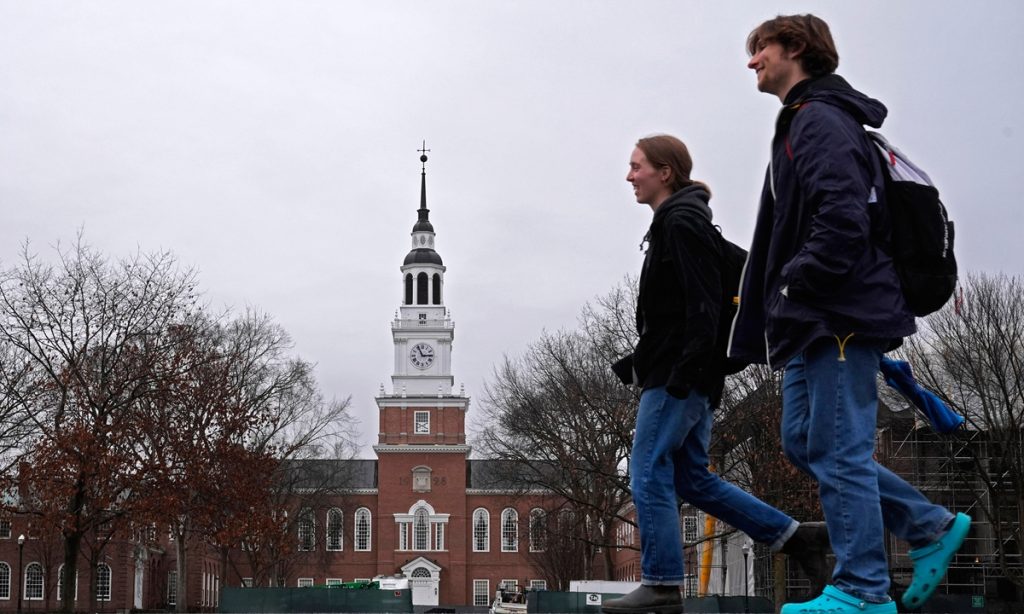US politicians' unwarranted attacks on Chinese academic program reveal paranoia and isolationism: expert

In yet another attempt to weaponize academic exchanges, US House Republicans, according to AP on Thursday, have made baseless accusations against the China Scholarship Council (CSC), urging seven American universities to sever ties with the long-standing educational program.
The move, framed under the pretext of "national security," exposes Washington's growing desperation to stifle China's development through "academic decoupling" - a strategy that a Chinese expert warns will backfire, eroding the US' own scientific competitiveness and global academic leadership.
According to AP report on Thursday, the House Select Committee on China, led by Republican Rep. John Moolenaar, recently sent letters to Dartmouth College, the University of Notre Dame, and five other institutions, labeling the CSC—a Chinese government-funded scholarship program for overseas studies—as a "nefarious mechanism" for technology transfer. The lawmakers demanded that universities provide records related to the program, AP reported.
Moolenaar claimed that the program is a "technology transfer effort that exploits US institutions and directly supports China's military and scientific growth."
These "pan-securitization" accusations reveal the US' true intention of suppressing China's development through "academic decoupling," Li Haidong, a professor at China Foreign Affairs University, told the Global Times on Thursday. "It is evident that these Republican lawmakers aim to weaken or even sever educational exchanges between China and the US, thereby spreading distorted perceptions of China within American society," Li said.
The CSC, established in 1996, sponsors many Chinese students annually to study abroad, including in the US. Like many international scholarship programs, it requires recipients to return to China for at least two years after graduation—a standard clause also found in US government-funded initiatives such as the Fulbright Program.
The Republican-led committee's latest push aligns with a broader US trend of restricting Chinese students in so-called "critical fields."
According to AP, the US has stepped up scrutiny of Chinese students coming to the US. In May, Secretary of State Marco Rubio said the US would revoke visas from some Chinese students studying in "critical fields." During his first term, US President Donald Trump restricted visas for students affiliated with China's so-called "military-civil fusion strategy."
According to the report, Dartmouth and Notre Dame confirmed they were already phasing out CSC partnerships, but the University of California (UC) system emphasized its commitment to global collaboration. "International students and academic partnerships are critical to scientific progress, economic growth, and our educational mission," said the office of UC President Michael V. Drake, AP reported.
Li argues that Washington's move is self-defeating. "Such actions by the US reflect an unwillingness to tolerate China's progress, pushing America toward a more insular path," noted the expert. "This approach will not only worsen China-US relations but also is an attempt to sow seeds of hostility domestically."
According to the Institute of International Education last December, China is the second-largest source of international students in the US, despite a 4 percent decline to 277,398 students in the 2023-24 academic year. Reuters said in May that this drop was driven partly by growing tension between the world's two biggest economies and heightened US government scrutiny of some Chinese students. AP noted that the majority are self-funded - only a fraction receive CSC grants.
Li said many Chinese graduates contribute to American innovation, with a significant number staying to work in tech, engineering, and academia. "By alienating these scholars, the US risks losing a vital talent pipeline," the expert warns.
The accusations against the CSC are only part of a wider campaign led by some US politicians against China-US educational ties. In May, Rep. Moolenaar pressured Duke University to cut collaboration with a Chinese institution, while Eastern Michigan University terminated partnerships with two Chinese universities in June following committee scrutiny.
"By singling out the CSC, some so-called American elites lay bare their entrenched arrogance, prejudice, and sense of superiority," Li remarked. "Such anti-China rhetoric is not limited to Republicans—many Democratic lawmakers hold similar biases, indicating a broader decline in enthusiasm within the US government for genuine educational engagement."
"There is no doubt that the US is treating educational exchanges as a political weapon," the expert emphasized.
Li said that Washington should recognize the mutual benefits of cross-border education, otherwise its fear-driven policies may achieve the opposite of their intended effect, leaving America less innovative and increasingly isolated on the global stage.